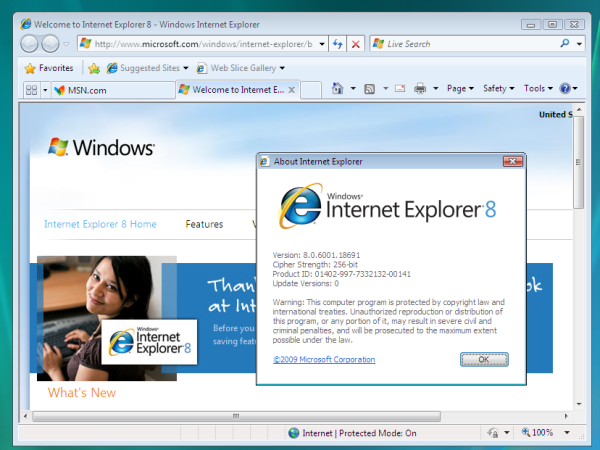A security firm recently found out that a zero-day vulnerability in Internet Explorer 8 has been used by hackers to install malicious trojans on the systems of nuclear weapons researchers and Department of Energy employees. Microsoft has confirmed the exploit and has provided guidelines on how to patch the exploit.
Interestingly, the zero-day exploit that has been found in Internet Explorer 8 is not found in any of the earlier or later versions of the browser. That is precisely why, Microsoft has advised the users to upgrade to later versions of the browser, so as to avoid incurring any harm due to the exploit.
Since the attack was directed at such employees who are directly involved with nuclear weapons, there are hints that it originated somewhere outside of the U.S. The attack involved compromising the U.S. Department of Labor website, which was then used as the home base to redirect users to other malicious links.
The exact web pages that were eventually hacked, were about such employees or contractors who have incurred different illnesses while working on atomic weapons. Once the computers of these employees were compromised due to the IE 8 exploit, a well-known trojan ‘Poison Ivy’ was installed on their machines. The trojan had been modified so that it could be detected only by 2 of the top 46 antivirus software. This essentially means that the attack was very sophisticated.
While such users who can update their browser from IE 8 to IE 9 or IE 10 are safe from the exploit, others who are not able to update their browser must follow these guidelines:
- Set Internet and local intranet security zone settings to “High” to block ActiveX Controls and Active Scripting in these zones
This will help prevent exploitation but may affect usability; therefore, trusted sites should be added to the Internet Explorer Trusted Sites zone to minimize disruption. - Configure Internet Explorer to prompt before running Active Scripting or to disable Active Scripting in the Internet and local intranet security zones
This will help prevent exploitation but can affect usability, so trusted sites should be added to the Internet Explorer Trusted Sites zone to minimize disruption.
Source: Invincea
Courtesy: Arstechnica
[ttjad]





One would expect nuclear weapons researchers to be too smart to use IE, no?
I had thought this kind of physics required a high IQ…